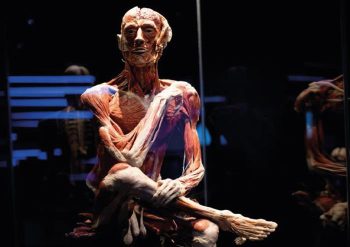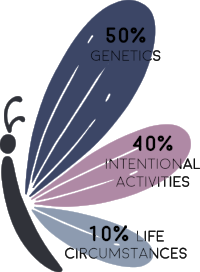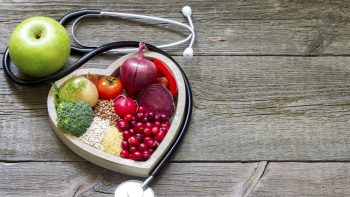You know the Body Worlds exhibition? Gunther von Hagens’ original museum experience uses human cadavers, preserved by rather remarkable methods, to give those of us still living a look inside our physical selves, in hopes that we’ll take better care of them.

When I arrived in London last month, there were flyers about Body Worlds in the hotel lobby and I booked a slot. I wanted most of all to see tendons and ligaments, since I’ve pulled and torn and sprained and strained so many of them. Expecting merely an anatomy lesson, I received instead priceless insights into how my body – all our bodies – work and the role they play in both health and happiness.
Photography was not allowed, but there was no rule against a pen and pad. The italicized quotations and bits of information come directly from the exhibition’s side notes. The rest is my commentary.
Your body is the harp of your soul. And it is yours to bring forth
sweet music from it or confused sounds. ~ Khalil Gibran
Neuroplasticity allows us to learn new skills but also affects our emotions. With positive thoughts, we can train our brains to be happy.
I was familiar with the change-your-thoughts/change-your-life notion from self-help tomes and even religion: “Be thou transformed,” St. Paul wrote, “by the renewal of thy mind.” Twenty years ago, The Secret went from New Age phenomenon to Oprah’s favorite thing, and took the “think good thoughts” concept to extreme ends, implying that we could think ourselves into the lives of our dreams. But never before in a scientific context had I been told that I could shape my contentment quotient, as measured by serotonin and dopamine levels and brain wave analysis, merely by dwelling on what is “true…honest…just…pure…lovely…and of good report” – quoting St. Paul again, who was way ahead of his time on this stuff.
Continual stress can cause blood pressure to rise, increase risk of heart attack and stroke, raise vulnerability to anxiety and depression, and hasten the aging process.
A certain amount of stress is thrust upon us, but sometimes we rent it a room in our psyche and refuse to evict. I personally take on stress like adding weight at the gym, as if it’s going to build my mental muscles. It doesn’t. It only tears me down.
Depression, social isolation, and excessive workloads can promote a heart attack as much as smoking, obesity, high blood pressure, or high cholesterol.
This one has special relevance for vegans and plant-based eaters who believe we’ve been rendered immune from this particular affliction. When a fit vegan succumbs to this most prevalent of all causes of death, it can seem as if nothing makes sense and nothing is to be believed. But we don’t know if those people were depressed or isolated. We can be fairly certain they were overworked because most vegans overwork. We carry the weight of the world. We’d be better off to put it down sometimes.
There is more wisdom in your body than in your deepest philosophy. ~ Nietzsche

50 percent of our capacity for happiness is genetically determined. 40 percent is determined by our thoughts, actions, and behaviors. Only 10 percent is determined by circumstances.
Yowza! I’ve always known that I did not win the genetic lottery when it came to turning lemons into lemonade. A penchant for melancholy is why I started working on myself and ultimately writing self-help books. But the idea that I am in charge of 40 percent of my happiness is an incredible concept. If those percentages could be turned into chunks of time, it would mean that even on a terrible days, when circumstances suck and every genetic impulse comes up as “Oh yes, it’s absolutely as rotten as it seems,” that’s only 60 percent of the day. It leaves a whopping six and a half waking hours to spend in various stages of “happy” — joy, peace of mind, contentment, euphoria, and great expectations.
When work causes us to neglect self-care, relationships, leisure, pleasure, spirituality, and other needs, our health suffers.
This one speaks to me directly. My work ethic would put me on the good side of Calvin himself. I somehow bought the myth that hard work will solve all problems, right all wrongs, and save all days, when indeed it can get to the point of causing problems, being wrong, and wrecking your day. Those of us who believe in our work, that it has ramifications far beyond our own sustenance and satisfaction, are especially prone to working overtime, during meals, and on the weekends. If that really changed the world, fine, let’s sacrifice ourselves. But it doesn’t. We can do our bit and have lives, too.

Let food be thy medicine and medicine be thy food. ~ Hippocrates 460-370 BCE
Our enteric nervous system is sometimes referred to as a second brain. 97 percent of our serotonin, a vital feel-good hormone, is produced in the intestines, which have a very large and complex nervous system. This produces, as in the brain, neurotransmitters, i.e., serotonin, dopamine, and endogenous opioids, responsible for our thinking, feeling, and remembering.
Not only diet but also the immune system and even the intestinal flora seem to be able to influence our emotions. Certain bacteria can produce precursors of the happiness hormone serotonin that reach the brain via the blood.
I’m no stranger to eating healthy, but eating happy? What a concept! The amino acid tryptophan, found in spinach, seeds, soy products, pineapple, and nuts boosts serotonin production in the gut. Additional serotonin is produced in the brain and whole carbohydrates such as fruits, vegetables, and grains are essential for this process to take place, as is ample hydration. And to keep gut flora in peak form, the prevailing wisdom is to avoid processed sugars and artificial sweeteners. Add some sunlight, exercise, and a bit of looking on the bright side, and we just might have the keys to bliss.
Life isn’t about finding yourself. It’s about creating yourself.”
~ George Bernard Shaw
Victoria Moran is an author, Main Street Vegan podcast host, and director of Main Street Vegan Academy, training vegan lifestyle coaches, educators, and entrepreneurs. She is also the producer of Thomas Jackson’s documentary, A Prayer for Compassion, to introduce vegan living to people of faith.


Fascinating! Thank you for sharing, Victoria!
Thank you for reading!
Victoria, you are thoughtful and brilliant! Great post.
This was a wonderful article Victoria. Brilliantly written, very engaging and highly informative. It sounds like you had a fabulous day at the Body Works Exhibition! Thanks for sharing this with us.
This came on the perfect day, after a bit of a rough stretch. Thank you, fine Victoria.Your shared vulnerability is admirable! I know these things (enough to advise friends), but it’s wonderful to have it echoed from the outside, and in your eloquent words. We need each other to help stay centered, which is the value of healthy relationships. I too have seen the Body Worlds exhibit more than once, and I’m always astonished by the resilience of the body and what it will put up with so long. We are built to respond and adapt. Existing within “smart homes,” let’s all choose to thrive! Health and happiness are inextricably entwined.
Thank you for your kind words Angel.
Victoria, that is an amazing blog, sprinkled with applicable Biblical wisdom. I relate to much of this!
Thanks, Vince. That means a lot.